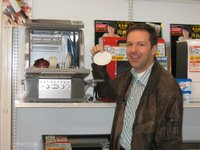January 26, 2006, 11:13 p.m. (edited January 27, 8:14 a.m.): Wow, what just happened? I didn't have time to catch my breath before my new manager whisked me off to a dinner with the new mainframe software sales leader, some of his staff, and some visiting sales managers. I jumped in the shower as fast as I could, grabbed the first clean shirt from my suitcase, then bounded downstairs to head off to a Brazilian restaurant in Tokyo. I think the restaurant is called Tucano. This all-you-can-eat meatfest, with two or three drinks per person, ran 6,600 yen each. There's no tipping in Japan, so the bill is the bill.
We rode the Ginza subway line to get there. That experience was a minor confidence builder because it's pretty simple to navigate. Each station has a letter and a number. For example, the
Capitol Tokyu is at station G06 (Ginza station #6). Subway lines are also color coded, and most signs are bilingual. Each exit is numbered, and the exit-related signage lists major buildings, such as IBM's (at Z10). I bought a 1,000 yen fare card, and, like Washington, D.C., you use the card both to enter and to exit the system. I think London is similar. Fares are based on distance traveled, but all the rides so far are just 160 yen each way, including the transfer between two lines. Riders jam themselves into the cars during rush hour, so it can get tight and pretty stuffy — buildings and trains seem all overheated by American standards. Piece of cake, really.
This morning we had an "all hands" meeting and, in contrast to IBM Americas, practically everyone works in the branch office and so there was a large auditorium full of suits. Two younger employees (one male, one female) had the honor of announcing each executive speaker. The Japanese are extremely punctual, and the speakers did a respectable job sticking to the published times. Each speaker followed a standard introductory greeting, with the audience responding in unison (with gusto). Most of the meeting was verbalized in Japanese, so I didn't understand too much, but most of the charts had English text. My manager lead the closing clap exercise: everybody stood up, and, after some Japanese phrase (which again I didn't understand), everybody clapped once in perfect unison (after one or two rehearsals). I guess I'm learning how to become a "company man."

The branch office is extremely hierarchical. Worker bees have open cubicles in the center of the floor area. Supervisors have larger work desks on the edges near the doors. General managers and vice presidents get the walled corner offices with assistants sitting close by. Today most people seemed to arrive around 9:00 or 9:30. Most people left around 8:00 p.m., but there were several who stayed at least until 9:30 p.m. More on that in a moment. I seem to be classified as a senior worker bee — or maybe just an oddball case.
I attended a series of meetings today, but the longest was an internal sales forecasting meeting. It's not normally my sort of meeting — I'm not a software sales representative (SSR) — but today's was fascinating. This sales team had a bad day, quite simply, because they just didn't have as much information as they should have about their potential customers. Software SSRs aren't at all happy about how the client teams seem to act as rigid gatekeepers with customers, although I've heard that one lots of times. The second half of the forecast review meeting will be tomorrow, so I'll be curious to see whether they do a better job.
In the meeting we discussed one customer that's so backlevel in their mainframe software versions that any updates would still not get them much support. IBM takes a good long time to drop support for older mainframe software versions, but this customer is in really rough shape. Please, please, don't do what this customer did! Mainframe applications — at least the well-designed ones — age gracefully. Middleware and operating systems do not age as gracefully. You have to stay "reasonably" current, otherwise it hurts your own business (or government agency). I'm sure I'll be elaborating on this point in future entries to explain why, but a variety of problems surface when you allow mainframe infrastructure to get too far behind. It's just basic maintenance, like changing your car's oil periodically.
I know many of the SSRs stayed up late tonight. I stayed until 9:30 p.m. trying unsuccessfully to get my computer to print to a strange Japanese printer, and I noticed that most of the zSeries SSRs also stayed while most other people had left. My theory is they stayed because I did. Ooops. I hope it was just because their manager deftly chewed them out.
 The most puzzling gadget I found was a tiny dishwasher that can handle perhaps five teacups and saucers. What's the point? Wouldn't it be trivially easy to hand wash that small number of dishes?
The most puzzling gadget I found was a tiny dishwasher that can handle perhaps five teacups and saucers. What's the point? Wouldn't it be trivially easy to hand wash that small number of dishes?
